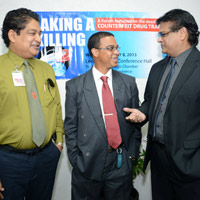(Trinidad Express) Twenty per cent of the drugs being bought and sold at local pharmacies are counterfeit drugs with deadly potential, Minister of Health Dr Fuad Khan has said.
Speaking at the British-Caribbean Chamber of Commerce’s “Forum on the Deadly Implications of Counterfeit Drug Trafficking” at the Trinidad and Tobago Chamber of Industry and Commerce, Westmoorings, yesterday, Khan warned those involved in the supply chain against the importation, distribution and sale of counterfeit drugs, which are mainly cancer drugs, anti-hypertension, anti-diabetic and antibiotics.
“About 20 per cent of the drugs here and worldwide are counterfeit drugs. Quite a lot of them are cancer drugs, anti-hypertension, antidiabetic and also antibiotics. What I would like to tell them (along the supply chain) is if they are partaking in the distribution of counterfeit drugs and these drugs are responsible for abnormal reactions and death of patients, then you are going to be held responsible eventually for any mishaps that occur and suffer the consequences for it.
“Not only the pharmacy people, importers and the Customs, whoever is along that supply chain of bringing these drugs in Trinidad.”

Khan, who cited several international cases where children died as a result of inactive ingredients in paracetamol or overactive ingredients and toxins in other cases, said everyone who sells counterfeit drugs knows it is counterfeit.
“There is nothing unknowing about it,” he said.
Khan said the label, the packaging, the language and the inserts in the box are usually good indicators the drugs are counterfeit.
“If the drug looks like the original, there are quite a few factors in it that would show that it is not original, and that is the packaging, the way it is put together, the consistency of the tablet,” he said.
Asked why the Ministry of Health had not put out a list of the counterfeit drugs being sold on the local market to warn the public, bearing in mind the potential negative impact such drugs could have on the consumer, Khan said, “We were compiling the list to put it out; whenever something like this happens we tend to put it out unilaterally one at a time.”
And although he did not have the exact number of counterfeit drugs on the ministry’s list, he said the ministry is working on a policy to treat with the issue that would include more Food and Drug inspectors, the introduction of an invoice distributor number to track the drugs, as well as the amendment of the Food and Drug Act.
“We are working to amend the whole act because it is quite old. But we have to make consumers aware and go after it with whatever we have in the system and make it work,” he said.
Khan has advised consumers to read the labels of the drugs they purchase, and if they have any queries or suspicions that the drug may be counterfeit, take it to the physician/s who prescribed it so they can look at it.
The invoice number, he said, is just the first part of the steps to be taken in identifying who is importing the counterfeit drugs, but it will also make Customs responsible for looking for the invoice distributor number.
Currently, there are 14 inspectors in the system, but Khan said about 15 or more are needed. He added that he hoped the policy would be ready by the end of the year but added the Ministry of Trade and Finance also had a role to play in curbing the issue with regard to regulations with Customs and Excise.





